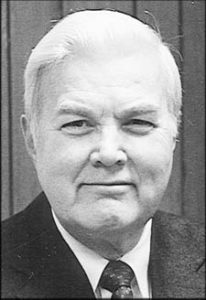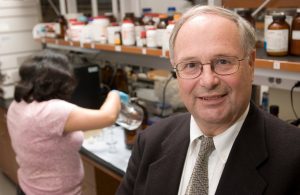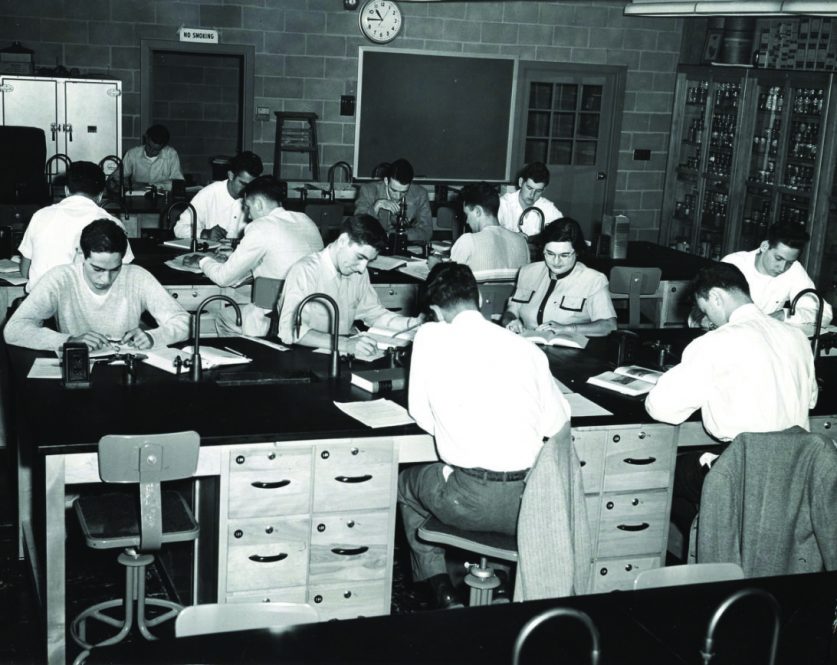Ann Petry: Making the Impossible Possible
Raised as a third-generation New Englander and Connecticut native, Ann Petry became the first Black woman to graduate from the Connecticut College of Pharmacy in 1931 (now, the UConn School of Pharmacy).
Anna Houston Lane, born in 1908, called Old Saybrook her home. In 1925, Ann graduated from high school as the only person of African American descent. Ann’s parents inspired her to push the limits of what was possible. Change-making didn’t scare the Lane family – Ann’s father, Pete, opened and operated two drugstores as a pharmacist. Her mother, Bertha James Lane, worked in a factory before becoming a shop owner, hairdresser, and chiropodist, and creating her own business, Beautiful Linens for Beautiful Homes. As the youngest of three daughters, Ann and her sisters were raised in “classic New England tradition” with strong familial role models who empowered her in light of systemic racial disadvantages.
“The Lanes were a close-knit, middle-class Black family, which provided the young Ann Lane with a strong sense of herself as well as with a level of confidence…” – A Yęmisi Jimoh (UMass ScholarWorks)
Ann, inspired by her aunt, Anna L. James, the first black woman pharmacist in Connecticut, became determined to continue breaking barriers for Black women and to carry on her family legacy by enrolling in the Connecticut College of Pharmacy in New Haven, which has since been transformed into the School of Pharmacy in Storrs. After receiving her Graduate in Pharmacy degree (Ph.G.) from the School, Ann worked in the family business for several years in Old Saybrook and Old Lyme. While working as a pharmacist, Ann also explored her other interest in writing, crafting short stories in her free time.

In 1938, Anne married George Petry, a Louisiana-born resident of Harlem. Soon after, Ann moved to New York City and set aside her pharmaceutical career to become a journalist and writer. She dove into the world of activism, inspired by the Harlem Renaissance, and wrote for The Harlem Amsterdam News and The People’s Voices while writing short stories and novels focused on the Black experience. While her husband was in service during WWII, Ann began work on her first novel The Street, which became the first novel by an African American woman to sell more than a million copies after its publication in 1946. Ann eventually moved back to Saybrook, where she continued her joy of writing, and passed away in 1997 with her loving husband and only daughter, Elizabeth Petry, by her side. Shortly before her death, she was inducted into the Women’s Hall of Fame in Connecticut where her legacy continues to live.
As the granddaughter of a slave who self-liberated and traveled to Connecticut through the Underground Railroad, Ann Petry had the forces of history against her. Yet, with the support of her loving family and friends, Ann wrote her own story – finding success in both pharmacy and writing.
Varro Tyler: From Pharmacognosist to Philatelist
A successful professor, pharmacognosist, and lifelong scholar, Varro Tyler graduated from UConn’s School of Pharmacy with his M.S. in 1951 and his Ph.D. in 1953, becoming the first individual to be awarded both degrees from the School.
Born in Nebraska in 1926, Varro was a Southern man at heart but moved to Connecticut for his academic pursuits in herbal medicine. Before attending UConn, he received his bachelor’s degree in pharmacy from the University of Nebraska and studied plant sciences at Yale on an Eli Lilly Research Fellowship for a year before attending UConn.

Having attained his pharmacy degrees from several colleges and universities, Varro couldn’t leave academics behind. His most notable roles include associate professor and chairman of the Department of Pharmacognosy at the University of Nebraska, a similar position at the University of Washington, and Dean of the School of Pharmacy and Pharmaceutical Sciences at Purdue University in 1966.
Along with his time in academia, Varro served as the first president of the American Society of Pharmacognosy and president of the American Association of Colleges of Pharmacy (AACP). As an active member of professional organizations and his community, Varro implemented his work in several settings – writing more than 270 publications and frequently appearing on TV and radio talk shows.
As the dietary supplement industry boomed in the 1990s, Varro urged the FDA to take a more assertive role in regulating product quality and manufacturers’ claims while writing a monthly column on herbal remedies for Prevention magazine. Varro grounded his interests in scientific research, opposing para-herbalism (herbalism based on pseudoscience) throughout his academic career.
Varro’s research interests were wide-ranging, including herbal medicine, medicinal and toxic constituents of higher fungi, drug plant cultivation, and more. In addition to his literature on these pharmaceutical topics, Varro was an avid stamp collector later in life and specialized in the postage stamps of Japan. As a philatelist, Varro wrote substantial literature on stamp forgery and had a long association with the International Society for Japanese Philately.
“Varro had a profound impact on pharmacy education, natural product science, and the use of herbal medicine” and received many awards and accolades.” – James E. Robbers (The American Society of Pharmacognosy)
After retiring in 1996, Varro continued to be passionate about his interests and passed away in 2001 with his loving wife, Virginia, by his side.
Mike Pikal: A Legacy That Lives On
With a UConn career spanning almost twenty-five years, Mike Pikal inspired thousands of students and faculty at the School and left an unmatched legacy.
Born in 1939 in Minnesota to parents Harold and Sophie, Mike was raised in the Midwest. He stayed close to home, earning his bachelor’s degree in Chemistry from St. John’s University in Minnesota. He later received a doctorate from Iowa State University in 1966.
Mike started his career as an assistant professor at the University of Tennessee before joining Eli Lilly Research Laboratories in the early 1970s. After years of dedicated research, Mike became a senior research scientist and won the 1996 President’s Award for his work at the company. Years later, in 1996, he joined UConn Nation as a professor of pharmaceutics.
During his time at UConn, Mike made the School proud, serving as the department head of Pharmaceutical Sciences and an Emeritus Professor while maintaining a fully active and highly productive research program. In 2005, he was named the first Pfizer Distinguished Endowed Chair in Pharmaceutical Technology.

Mike’s research spanned freeze-drying, solid-state chemistry/materials science of pharmaceuticals and protein stability, which led to more than 170 publications. Particularly interested in freeze-drying, Mike was a leader in this field and its technology and was the main contributor to the School’s successful partnerships with groups like The Center for Pharmaceutical Processing (CPPR) and The National Institute for Innovation in Manufacturing Biopharmaceuticals (NIIMBL). He also directed a prominent and diverse research program in freeze-drying. Because of these efforts, as well as his membership in various pharmaceutical associations, Pikal won several awards, becoming one of fewer than twenty scientists to receive the AAPS Distinguished Pharmaceutical Scientist Award.
While all his accolades and research pursuits are outstanding, the School is especially grateful for the relationships Pikal formed with his Ph.D. students, postdoctoral fellows, and visiting scholars. Selflessly giving his time and advice to those starting in the pharmacy field, Pikal was truly an inspiration to those around him.
Surrounded by his loving wife, Janice, five children, and many grandchildren, Pikal passed away in 2018, a year after retiring from UConn.
“Mike is just in a different league than most of the rest of us. One of the many things we love about him is that he never makes us feel that way.” — Steve Nail (Journal of Pharmaceutical Sciences)



